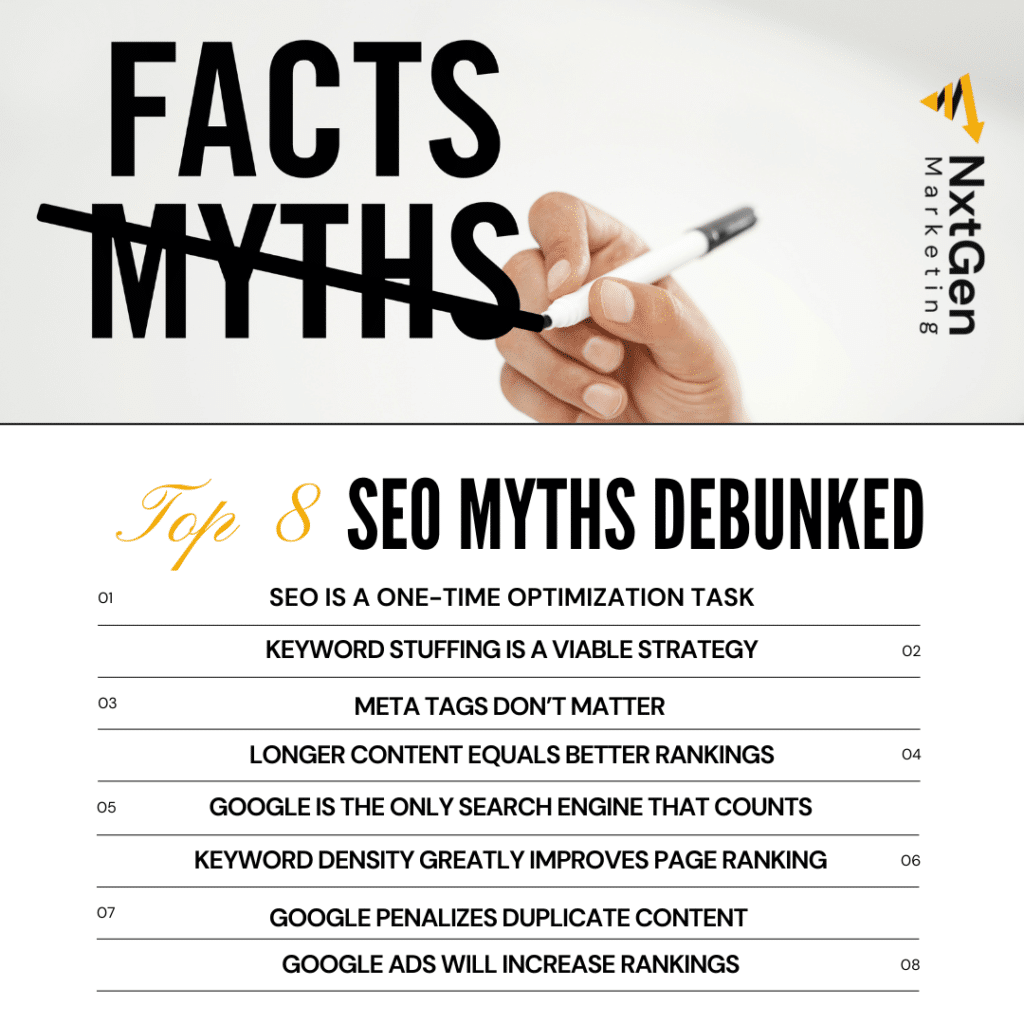Today, search engine optimization has become a pivotal marketing channel for all types of businesses, including small, medium, and large. There are hundreds of Google search ranking factors, and so many misconceptions revolve around the ranking factors.
With so much information out there, sometimes it can get difficult to know what information is correct and which one isn’t.

10 Common SEO Myths Debunked
If you are new to digital marketing, you probably would have encountered many misconceptions about SEO. When developing an SEO strategy for your business, check out these digital marketing misconceptions and formulate your strategy accordingly.
1. SEO is a one-time optimization task
We often see many digital marketing agencies offering one-time optimization packages to businesses. And, we also come across many clients asking for one-time SEO optimization packages. The problem is that SEO is not actually a one-time task; it’s an ongoing process. Doing the website’s on-page optimization once can’t make it rank for all the desired keywords.
While initial optimization is essential, continuous updates and adaptations are crucial. Regularly auditing and refining your SEO strategy ensures your website remains relevant, competitive, and aligned with changing search engine guidelines.
2. Keyword stuffing is a viable strategy
Over time, Google’s search algorithm has been updated a lot. In the initial days, it was possible to rank for almost any keyword just by stuffing targeted keywords in the title, meta description, URL, and content. But today, the search algorithm is improved. It gives more weightage to content quality and relevance rather than keyword stuffing.
Keyword stuffing, or unnaturally cramming keywords into content, now leads to penalties rather than improved rankings. The emphasis has shifted towards using keywords contextually and naturally within high-quality, valuable content that caters to user intent.
3. Meta tags don’t matter
Many people think that they can randomly add any title of their desire, and adding a meta description is not required as it will excerpt from the content. However, the truth is that meta tags matter a lot. Meta titles and descriptions provide important information to the users as well as search engines.
First of all, you can use your targeted keywords in the title as well as the meta description to get a ranking for those particular keywords. Another thing is that nicely written meta tags can encourage users to click on the URL and land on your website. Therefore, it’s safe to say that meta tags do matter, and they can affect CTR (click-through rate).
4. Longer content equals better rankings
There’s a misconception among SEOs that publishing long-form content on the website will help the website get better rankings, which is not true. It’s not about how long your website content is; it’s more about how well the content is written and whether it satisfies user search queries or not.
There can be a long-form content piece published on the website, but it doesn’t answer what the user is looking for. In that case, Google will give priority to a website that answers a user’s search query (even if its content is shorter in length). In short, concise & well-structured content that effectively addresses user queries often outranks lengthy but irrelevant content.
5. Google is the only search engine that counts
Google has always been a top choice among SEOs as well as among users. However, Google isn’t the only search engine out there. While preparing and executing an SEO strategy, we can’t neglect other major search engines like Bing, Yahoo, and Yandex.
Collectively, they cater to a significant portion of internet users. Diversifying SEO strategies to encompass multiple search engines widens the potential audience reach and can drive substantial traffic.
6. Google penalizes duplicate content
There’s this myth around content duplication that Google penalizes websites with duplicate content. Well, the reality is that Google doesn’t penalize duplicate content outright; it aims to present the most relevant and valuable content to users.
It’s safe to say that duplicate content can negatively impact your rankings, but that’s a different thing than getting penalized by Google. Duplicate content like quotes or product descriptions don’t severely impact rankings. However, unique and original content generally performs better in search results.
7. Keyword density greatly improves page ranking
Previously, keyword density was a primary focus for SEO. However, search engines now prioritize natural language and user intent. Rather than fixating on specific keyword percentages, the emphasis should be on relevance, context, and user experience. Content should flow naturally while effectively addressing the user’s query to rank well.

8. Google Ads will increase rankings
Google Ads and SEO are both different things. Many people think that starting a Google Ads campaign will improve their organic rankings on Google, which isn’t true. The paid ad space is separate from organic search results, and paying for ads won’t automatically boost organic rankings.
However, a well-optimized paid advertising campaign can complement an organic SEO strategy, enhancing overall visibility. It means SEO and Google Ads can deliver excellent results when you work on both altogether.
9. Bounce rate is a ranking factor
Bounce rate is the percentage of website visits with no interactions beyond the landing page. Many SEO professionals argue that bounce rate is a ranking factor, which isn’t. If a user lands on a service from an organic search and leaves the website without further action, it will be considered a bounce rate.
No interaction beyond the landing page doesn’t mean the visitor is not satisfied with the result. Depending on your business model and the type of funnel you created, there is a high chance that the user had read all the information he/she wanted and left the site with conversion. In such a scenario, the user is actually getting what he/she is looking for. That’s why bounce rate can’t be considered a search ranking factor.
10. Adding more website pages is beneficial
“More the merrier” might not always be true when it comes to SEO. What many new SEOs do is create tons of pages with thin, spammy content, thinking more pages will help them rank for more search queries. Well, that’s not how it works anymore.
No matter how many web pages you create to support your SEO strategy, just make sure all your pages have high-quality & relevant content and are user-friendly. Adding pages for the sake of quantity without valuable content can dilute overall site quality. Instead of focusing on quantity, try creating a few pages with the best content and design layout.
Final Thoughts
As search engine algorithms advance and user behaviors shift, debunking common SEO myths, such as the outdated efficacy of keyword stuffing, becomes crucial.
In today’s landscape, to truly excel in the SEO game and stand out in the crowded digital market, it’s essential to prioritize creating and publishing high-quality content while focusing on improving user experience and employing strategies like local SEO service to connect effectively with your target audience.










